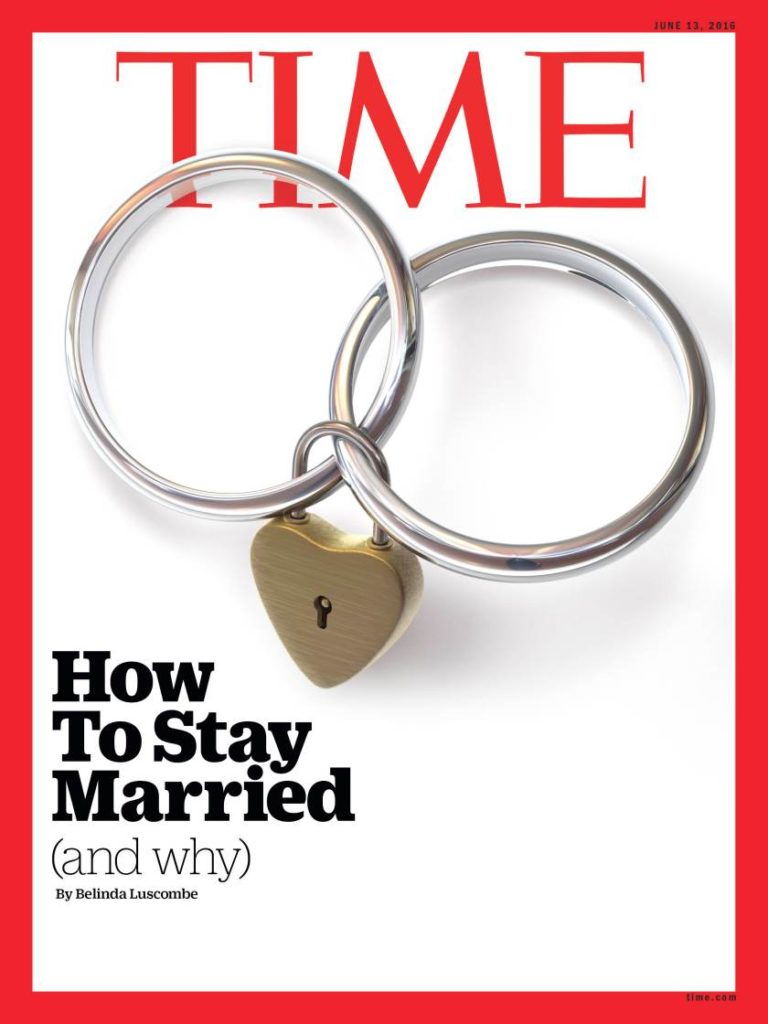The cover of a recent Time magazine declared, “How to stay married (and why).” As you probably know, I am not against marriage or for it either despite the fact that I co-wrote a book about marriage. 
OK, yes, my co-author and I did say in the book that we were for marriage, but — and this is a big but — only because it offers the best legal protections and benefits for couples right now. That may change in the future, and personally I hope it does; why should the government decide who gets what based on his or her love life? That mattered when there were few options, but now there are many. It no longer makes sense, and it also leaves a lot of caregiving unprotected.
And for cohabiting couple like economists Betsy Stevenson and Justin Wolfers, who are not married but have a child together and have drawn up a contract, marriage isn’t all that necessary — they’ve done the essential work of detailing what they want their partnership to look like. If everyone did that — and I have no idea why committed couples don’t — we really wouldn’t need marriage, although couples still might be missing out on certain government perks, especially tax breaks. Which gets us back to the financial aspect of marriage that few want to address — even Johnny Depp and Amber Heard, divorcing after just 15 months of marriage and no prenup: marriage is, at its heart, a financial arrangement. Yes, it’s about the money and stuff, even if we really want it to be about love.
The pressure to marry
But, getting back to the Time article, journalist Belinda Luscombe gives a somewhat relatively balanced view of the studies indicating the pluses and minuses of marriage. Still, the end result is the same (evidenced by the title) — you probably should marry, as long as you learn how to be properly married, and probably should stay married.
Tireless singles advocate Bella DePaulo, whom I know and greatly respect, and other singletons saw the article as shaming singles; I don’t. Still, what concerns me about such articles, as seemingly balanced as they are, is that there isn’t full transparency about the studies (which DePaulo rightfully continues to address, to often deaf ears) and, perhaps more important, many of them don’t full address the many options available to us now that might indicate similar results. There are scant longitudinal studies on independent men and women who prefer to live alone, live apart together for the long term or cohabit, and until there are, we really won’t know whether marriage is still the best arrangement for couples. As I wrote recently, if you love someone, do you really need a legal arrangement binding your commitment?
The benefits of alternative arrangements
Recently, there have been some interesting studies that show that cohabiting couples — a hugely growing segment of society — often go to couples therapy earlier than married couples and, guess what, they feel more satisfied and committed by the experience. Why? As the study notes, “Without the institutionalized rules of marriage, cohabiting couples may perceive threats to their relationship earlier than married couples.” And some studies indicate that the stigma of cohabiting — versus being married — impacts younger couples, probably feeling the need to follow a normative romantic path, much more than older couples, who seem to fare quite well cohabiting or even as living apart together couples.
All of which means that before we tout the presumptive benefits of marriage for everyone, we should be willing to explore what’s working for those who are happily living alternatively and whether what doesn’t work for them is the actual arrangement or the societal expectation that committed couples marry and live together as well as the judgment they face if they don’t follow the romantic script. And, we need to look at whether marriage matters for couples past the baby-making years or for those who chose to be childfree.
What if those societal expectations didn’t exist? Would Time magazine or other mainstream media still tout the benefits of marriage, especially long-term marriage?
We really don’t know. I just wish that the possibility that it might not make a difference would be acknowledged.
Want to learn how to create a marriage based on your values and goals? Order The New I Do: Reshaping Marriage for Skeptics, Realists and Rebels on Amazon, and follow TNID on Twitter and Facebook.

















It’s worthwhile to examine the potential success of non-married couples versus married (for the sake of argument, let’s exclude common law marriage). After all, love and marriage are not the same thing and you can have one without the other.
However, it is also important to examine the role marriage plays in establishing a family and the responsibilities and expectations of family versus long term partners with no legal ties. For example, non-married couples are not legally responsible for each other in the event of dire health problems but married couples are expected, legally and ethically, to provide care for spouses. A boyfriend is legally free to abandon a seriously ill girlfriend perhaps with some negative judgement. A husband who abandons a sick wife is rightfully condemned and possibly faces legal consequences.
Has American society reached a stage where concepts of family, excepting blood relations (for the moment), are now irrelevant? If so, what are the social consequences resulting from the breakdown of traditional families that were previously defined by marriage? Which family responsibilities fall exclusively to blood relatives and the state in the absence of marriage?
Hey guys, cohabitating couples are more happy than married couples. Think about that before you get into any legal contract (marriage) that puts your hard earned assets at risk.